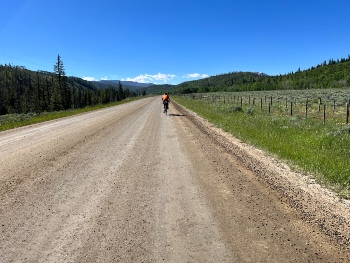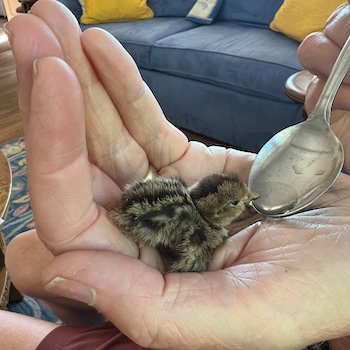
We recently visited relatives Grace and Mason, who live an adventurous life in Big Sky, Montana with their dogs Pippi and Birdie. Pippi is a high energy, small size dog. When Grace and Mason stayed with us in Bend during a summer road trip, Pippi and Birdie were with them. We were sitting around in the living room after dinner one evening, talking about road trips, and dogs. Mason explained that Pippi had this weird internal clock, and every night at 8:30 (within a minute or two either side), Pippi, who had been dozing in her favorite spot on the couch, would suddenly wake up, hop off the couch, go get a drink of water, and head to her bed for the night. And sure enough, shortly after he told this story, suddenly Pippi wakes up, hops down off the couch, and goes to get a drink of water. My first thought was “Wait, it’s not that late, it can’t be 8:30.” Then I looked at my watch and noticed the time was exactly 7:30, and realized that, for whatever reason, Pippi’s internal clock was permanently set on Mountain Time, whereas Bend is on Pacific Time. Pippa clearly likes a schedule, and it works for her.
When I retired from civil engineering in 2017, I received some good advice. Someone told me not to make any new commitments for the first year. They explained that when people heard I was retiring, they would figure I had 40 extra hours a week (or in my case, 60-70 extra hours a week) that I could now spend helping them advance their causes or projects. The advice was to give myself time to find my own rhythm for retirement before assessing how much ‘extra’ time I had to be involved with others.
Those turned out to be wise words. I was surprised how little extra time I had for not going to a regular job. First off, I got 8-10 hours a sleep now instead of 5-6. Then, I got to spend a couple of hours with Francie in the morning, reading the paper, sipping coffee, and discussing stories of interest. And I got to take a half hour to eat lunch. So I didn’t have nearly as much extra time as I had expected. There are still things that I find I don’t make time for, like exercising, and reading.
When friends who are retiring ask me for advice, I pass along the advice I got, and add the following. When they are about to retire, most people think about the things they don’t like about their job that will go away; waking up early, the commute, meetings, difficult people at work, having to dress up, emails, HR issues, etc. What they often don’t think about is the things that they do like about work, which will also go away (besides the paycheck); the people you enjoy and often have a long history with, the challenge, being part of a team, learning new skills, acknowledgment, the structure to the day. If you don’t have a plan for incorporating those good things into your retirement, you risk being one of those retired people who goes in to hang around at the office, bothering the people still there trying to get work done.
For me, some kind of schedule was important. Studies show that a job can provide a sense of purpose, structure, and self-identity that are important for mental health. When I retired, I developed a new routine that helped me accomplish things I wanted to do, and gave me that framework and structure. And the routine is different when we travel (which is often), and it goes in seasons (to make room for special projects), but it’s a part of a satisfying life. Where you are in life, and who you are, may determine whether a schedule is more of a tyrant or a blessing. Find your own sweet spot, and check in with yourself frequently…






Amen brother, “find your sweet spot.” Couldn’t agree more and it’s a GREAT reminder to keep making adjustments. Cool story about that dog…are you kidding me!
I kid you not!
What’s up, just wanted to mention, I enjoyed this article. It was inspiring. Keep on posting!